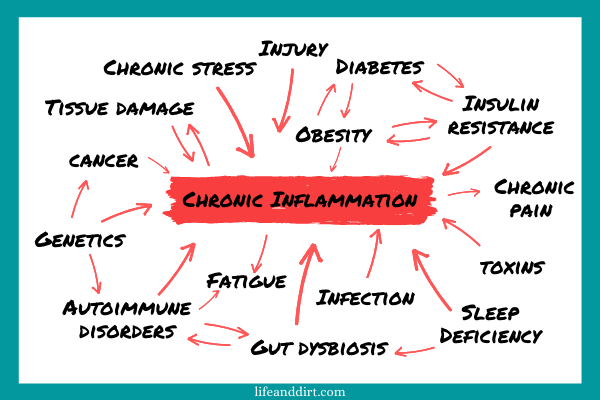Inflammation is a major topic of concern when it comes to pretty much every health condition or issue.
You’ve probably heard the word “inflammation” thrown around as the culprit or consequence of various health problems, and the advice to avoid and reduce inflammation in the body has definitely gained popularity recently.
But what exactly is inflammation, how bad is it, and how can you reduce inflammation?
This article will give you the low-down on what inflammation is, the causes and consequences of inflammation, and how and why to reduce inflammation in the body (free printable included!).
What is Inflammation?
Inflammation is actually a completely necessary and vital part of the body’s immune response.
After some form of infection or injury, you typically experience an immediate inflammatory response consisting of swelling, redness, pain, heat, and other related symptoms.
These symptoms occur as a result of your body sending over blood and immune cells (antibodies, proteins, signalling molecules, etc.) to the area of injury – or throughout your body in the case of some infections.
While it may seem like the inflammatory response causes harm to the body, it is just a short-term protective measure to stop worse things from happening. By handling the situation immediately, inflammation is very important for activating the immune system to defend and heal the body, and stopping problems right away before they get out of hand.
This fast-acting, short-term inflammatory response is known as acute inflammation, and symptoms typically last only a few hours to a few days.
So, when is inflammation a bad thing?
Inflammation becomes an issue when it persists, known as chronic inflammation.
Chronic inflammation can be harmful because it triggers specific immune responses over time, which can disrupt your body’s normal functioning, cause tissue and cellular damage, amplify any present or future health problems, and trigger chain reactions of inflammation and excessive immune system activity in the body.
Chronic inflammation can last for weeks, months, or even years, depending on its cause(s).
Your body is not meant to constantly be in an inflamed state of defense; inflammation should only be triggered in those situations of injury or infection.
Almost all chronic conditions, such as obesity, diabetes, autoimmune disorders, cardiovascular diseases, neurological disorders, and cancer, cause/exacerbate inflammation and/or are caused/exacerbated by inflammation.
What Causes Chronic Inflammation?

Chronic inflammation can result from a variety of genetic, environmental, and lifestyle factors, including:
- Food: some foods are more likely to trigger inflammation than others. Some foods help actively reduce inflammation in the body. (More on this below).
- Sleep: sleep deprivation or poor quality of sleep can keep your immune system stimulated (causing low-level, chronic inflammation) and reduce healing. Too much sleep can also increase inflammation.
- Stress: chronic and severe stress can keep your immune system stimulated.
- Prolonged infection: ongoing, untreated infections can cause prolonged inflammation in the tissues, and inflammatory flare-ups. Prolonged acute inflammation can turn into chronic inflammation.
- Prolonged injury: over-exertion, repeated movements, prolonged physical strain and tissue stress can all turn acute inflammatory responses into chronic inflammation.
- Autoimmune conditions: typically genetic disorders where the body’s immune system mistakenly attacks its own healthy tissues, causing harm, dysfunction, and inflammation in the body. Autoimmune disorders include multiple sclerosis, rheumatoid arthritis, celiac disease, type 1 diabetes, and more.
- Exposure to toxins: toxins can come from chemically-treated and nutrient-void food, industrial chemicals, cleaning products, skin care products, air pollution, smoking, alcohol, and other irritants and allergens.
- Oxidative stress: highly reactive and potentially harmful molecules called free radicals are a product of normal cellular metabolism. Free radical production can also be amplified by things like stress and toxin exposure. Without sufficient antioxidant activity in the body, free radicals can build up and cause oxidative stress as they damage healthy cells in the body, causing inflammation and potentially leading to tissue damage and various chronic diseases.
- High blood sugar and insulin resistance: chronically elevated sugar and insulin levels in the blood can cause chronic inflammation.
- Obesity
- Disruption/dysbiosis of the gut microbiome
- Medical history
- Other genetic conditions and predispositions
Inflammation can be reduced by zeroing in on these factors and eliminating them from your life, or reducing their occurrence in your life.
Let’s take a look at what these ways of reducing inflammation look like…
5 Ways to Reduce Inflammation
1. Maintain a healthy gut
Your gut microbiome is an absolutely crucial part of your immune system and overall health. The trillions of bacteria and other microbes living in your gastrointestinal tract are in constant communication with your immune system.
Different gut bacteria can produce signalling and regulatory molecules, promote production of immune cells, and ultimately greatly influence the immune system’s inflammatory response (1, 2).
If the gut microbiome becomes unbalanced, this can trigger unwanted immune signalling and inflammation, or cause excess inflammation when and where it is not needed.
So, keeping inflammation in check relies heavily on keeping your gut microbiome balanced and healthy.
This can be done via food, primarily. Fibre-rich foods and fermented foods are great for the gut, while highly sugary and processed foods are not. (see #2 below)
Gut health also relies on adequate sleep, while things like stress and antibiotic use can disrupt the microbiome balance.
2. Eat anti-inflammatory foods; avoid pro-inflammatory foods

Which foods reduce inflammation?
Antioxidant-rich foods: antioxidants are compounds that counteract harmful free radicals and oxidative stress in the body. By keeping antioxidant intake high, you can help keep inflammation down.
Plenty of common, healthy, whole foods are rich in antioxidants.
Here are some of the best antioxidant-rich foods:
- berries: blueberries, strawberries, raspberries, etc.
- dark green leafy vegetables: kale, spinach, collards, chard, etc.
- cruciferous vegetables: broccoli, bok choy, cabbage, kale, collards, cauliflower, Brussels sprouts, etc.
- fatty fish: salmon, tuna, mackerel, sardines, etc.
- nuts: walnuts, pecans, almonds, etc.
- olive oil
- avocado
- lemon
- ginger
- garlic
- turmeric
- cinnamon
- cayenne pepper, black pepper
These antioxidant-rich foods are also great because they are packed with tons of important nutrients and bioactive components that are beneficial for your immune system and overall health.
Note on anti-inflammatory nutrients: several important vitamins and minerals function as antioxidants, and are crucial for proper immune functioning and regulation. Micronutrients such as vitamin D, vitamin C, and zinc, all play vital roles in the regulation of inflammatory activity.
Probiotics & prebiotics: probiotic- and prebiotic-rich foods help maintain a healthy balance of beneficial bacteria in the gut, which help regulate proper immune signalling and inflammatory responses.
Pro/prebiotic rich foods include:
- high-fibre foods such as fruits, veggies, and whole grains (prebiotics)
- fermented foods such as kefir and sauerkraut (probiotics)
Which foods promote inflammation? (i.e. what foods to avoid)
High amounts of refined carbs and added sugar can lead to problems such as obesity, insulin resistance, diabetes, and, of course, inflammation.
Highly processed foods (which also tend to be high-sugar foods) have the same negative health effects.
Regular consumption of sugar-rich, highly-processed foods can also majorly mess up the balance and diversity of the gut microbiome.
To reduce risk of chronic inflammation (along with risk of many other associated health issues), reduce consumption of foods like:
- sugary drinks (pop, juice, etc.)
- refined carbs and grains (white bread, white pasta, etc.)
- processed meat
- vegetable oils
- typical junk food like candy, cookies, ice cream, packaged desserts, and fried food
- other highly processed foods
3. Get proper sleep
Proper sleep is very important for regulating inflammation. Plenty of research has shown that sleep deficiency is associated with increased inflammatory activity (3).
But watch out because too much sleep is actually no good either and can also increase inflammation (4).
7-8 hours of quality sleep seems to be the sweet spot.
4. Minimize stress
In addition to prioritizing sleep, it is very important to prioritize stress reduction.
Chronic stress and chronic inflammation are tightly linked; inflammation has been found to be the common factor between a variety of stress-induced chronic diseases (5).
Stress management tips include eating a balanced, nutrient-dense diet, being physically active, and getting proper sleep. (see this post for more on stress).
Stress and sleep also go hand in hand, where too much stress can cause too little sleep, and vice versa. Getting sufficient sleep and minimizing stress both also contribute to a healthy gut.
5. Be physically active
Further study is still required to determine what level of exercise is best for reducing inflammation; the reduction of inflammatory markers appears to depend on factors such as duration and intensity of the exercise.
On one hand, an inactive lifestyle can promote inflammation. One the other hand, prolonged, intense exercise can be a cause of physical stress and inflammation. Moderate activity, with proper rest and healing, may have a more beneficial anti-inflammatory effect.
One study looking at university students found that moderate-intensity exercise decreased TNFα – a marker of inflammation (6).
Another study found that in older men and women, aged 70-79, the higher the level of exercise, the lower the levels of inflammatory markers such as CRP, IL-6, and TNFα (7).
The general recommendation is at least 150 minutes of moderate physical activity each week. Adequate physical activity (especially in combination with a healthy diet) can help reduce the risk of obesity, insulin resistance, and other pro-inflammatory diseases.
Studies have shown that exercise/physical activity can help reduce risk of obesity and diabetes by reducing low-grade, systemic, chronic inflammation. However, one scientific review noted that it is unclear as to whether it is the exercise or the resulting change in weight/body composition that actively reduces the inflammation (8).
Either way, exercise and physical activity is a great place to focus on to help reduce inflammation as well as inflammatory conditions like obesity and diabetes.
Summary
Inflammation is part of the body’s immune response. While short-term acute inflammation is necessary for healing, long-term chronic inflammation can be harmful. Inflammation can be caused by a variety of factors such as food, stress, infection, and other chronic conditions. Chronic inflammation can be reduced or prevented by maintaining a healthy gut, maintaining a healthy diet, getting enough sleep, reducing stress, and being physically active.
I hope you enjoyed this article on inflammation and ways to reduce it. What have you found works for reducing inflammation? Let me know in the comments below!
Oh, and don’t forget to grab your free anti-inflammatory foods list printable!

